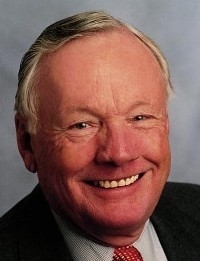 |
| Neil Armstrong (http://www.londonspeakerbureau.co.uk/motivational_speakers.aspx ()) |
Silence loomed over America. Everyone had his or her ears by the radio, waiting attentively for the historical event to unfold. "Houston. Eagle base here. We have landed" (Neil Armstrong). Cries of jubilation and joy burst out from every American home listening to the good news. As these famous words were transmitted, one of man's greatest accomplishments was inscribed on America's timeline: landing a man on the moon. On July 20, 1969, Neil Armstrong became a world inspiration and hero, whose name became well known throughout history. He would become the heroic figure known for pioneering the path for many other astronauts. Born on August 5, 1930, Armstrong grew up in Wapakoneta, Ohio, fascinated by airplanes and flight. His interest grew, leading him to become a test pilot and later, a NASA astronaut. For his numerous achievements throughout his life, Neil Armstrong has been rewarded, most notable for the Presidential Metal for Freedom and the Congressional Space Medal of Honor. However, Neil Armstrong could have never done anything he had accomplished without his character. By accomplishing what was thought impossible and making a dream into reality, Neil Armstrong, the first man to set foot on the moon inspires others with his dedication to his work, his courageous heart and actions, and his humble mind-set.
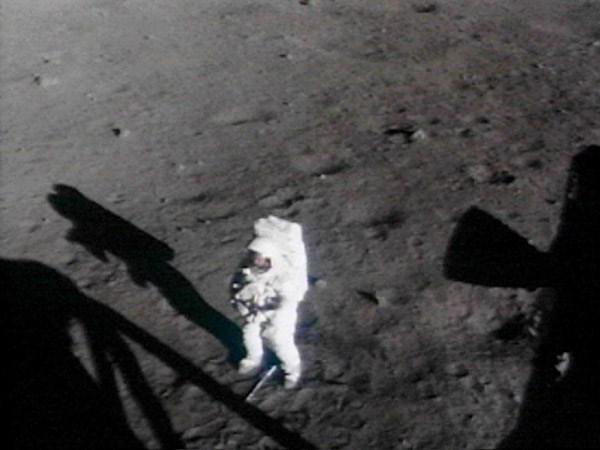 |
| Armstrong on the moon (http://moonpans.com/Neil_Armstrong_on_the_moon.htm ()) |
Finally, Neil Armstrong inspired others with his humble mind-set. He never forgot to think of and thank the people who had helped him do what he had done. "A quiet man who valued privacy, Armstrong rejected most opportunities to profit from his fame" (Notable Scientists from 1900 to the Present). In our world of greed and selfishness, pride takes over people's thoughts and actions. Armstrong could have chosen a popular, easy life but he chose to avoid the media. He could have benefited himself by taking the opportunities of fame but he chose to be treated like everybody else. He did not put himself above anyone else because of his success. Armstrong saw equality in all men and believed that we all deserved to be treated the same way no matter what you did. He did not feel that he was more important than anybody else to be receiving so much attention. As he took his step on the moon, Armstrong said he "...thought about all those 400, 00 people that had given me the opportunity to make that step..." (Schorn). Armstrong remained a thankful person throughout his life, never hindered by the fame and praise. He always remembered the people who had given him the opportunity to make the decisions he made. He repays the support the people had given him by continuously contributing to the world with his good deeds. Neil Armstrong is a one of a kind person, who has a strong heart to resist temptations and to continue to be humble.
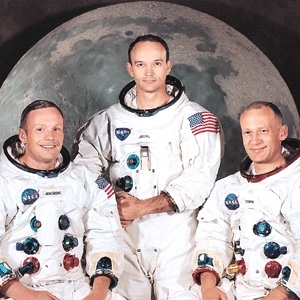 |
| Crew of Apollo 11 (Armstrong on the left) (http://www.spacekids.co.uk/moon/ ()) |
Before the presidency of John F. Kennedy, landing a man on the moon was merely a dream. Missions of landing were ridiculed. However, Neil Armstrong did it and struck America with hope. "Apollo 11, in particular, also boosted Americans' confidence in their ability to solve society's problems. The moon landing became proof of American competence and achievement. 'If we can send a man to the moon,' a popular expression asked, 'why can't we cure cancer, clean the air, end poverty, etc.?'" (Van Riper). I look up to Neil Armstrong because he taught me an important lesson through his life story; he taught me to never give up. He reminded America, and the world, that anything is possible if you just don't give up. He taught us that anything could be achieved through determination and dedication. He showed us that we could do anything if we just put our minds and hearts into it. Another reason why Neil Armstrong is my role model and hero is because he gave me an optimistic mind-set. He made a positive impact on the way people think. He gave people confidence and a feeling of "I can do anything." He switched the way we think; he motivated us to not only "think", but to "do". He showed us how to push ourselves beyond our limit to succeed. He demonstrated through his dedication to never be satisfied with what you have done but to strive for more. He gave me the heart to pounce on opportunities and to always get back up when I fall. He inspires many others with his defined character and his virtues. Neil Armstrong was only one small man, but he changed the world by never backing down. Neil Armstrong indeed, not deserves, but earned his title of a hero.
Works Cited
Jones, Eric M. "Project Apollo: Astronaut Biographies." History Home. NASA, 08 June
2011. Web. 05 Jan. 2012. .
"Neil Armstrong." Notable Scientists from 1900 to the Present. Ed. Brigham Narins.
Detroit: Gale Group, 2008. Gale Biography In Context. Web. 14 Dec. 2011
Schorn, Daniel. "Being The First Man On The Moon ?OB CBS News." Breaking News
Headlines: Business, Entertainment & World News. CBS News, 6 Nov. 2005.
Web. 14 Dec. 2011
Van Riper, A. Bowdoin. "The 1969 Moon Landing: First Humans to Walk on Another
World." Science and Its Times. Ed. Neil Schlager and Josh Lauger. Vol. 7: 1950
to Present. Detroit: Gale, 2001. 19-22. Gale Virtual Reference Library.Web. 13
Dec. 2011
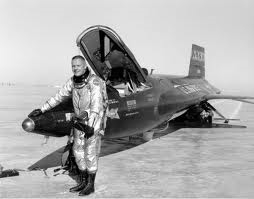 |
| Armstrong as a test pilot (http://www.sciencephoto.com/media/335136/enlarge ()) |
One strong character trait that left a big impression on the world was his dedication to his work. Armstrong showed dedication to his field while preparing to become an astronaut, during his famous career, and after retiring from a long and fulfilling job. At the age of six, Armstrong discovered his love of flying and dedicated himself to learning to fly: "he worked a variety of jobs to pay for his flying lessons" (Notable Scientists from 1900 to the Present). He developed a drive and motivation. He worked hard to reach his dream and to satisfy his childhood fascination for flight. Armstrong took everything into his own measures and did everything he could have done at his age to excel in flight. Only because of the lengthy time he had invested when he was young to learn was he able to become the illustrious astronaut we all know today. During his career as a NASA astronaut, a tragic event impacted Armstrong's life: the death of his three-year-old daughter, Karen. During a rare interview at 60 Minutes, Neil said with tears: "I thought the best thing for me to do in that situation was to continue with my work, keep things as normal as I could. And try as hard as I could not to have it affect my ability to do useful things" (Schorn). Even when a tragic event occurred, he stayed composed and tried to positively contribute to those around him. He was determined to become the best at what he did and wanted to leave an impact in the world of astronomy. Therefore, he was able to work hard and help others despite depressing times. Even after his retirement from NASA, he continued to work when he accepted a position at the University of Cincinnati where "he spent seven years engaged in teaching and research as a professor of aerospace engineering" (Notable Scientists from 1900 to the Present). He continued to share his love and joy of his work by teaching others. Dedicated to his work, Armstrong worked hard to change and inspire his students through his passion for astronomy. Throughout his life, Neil Armstrong has constantly been labeled as a passionate and dedicated man, giving his all to make the world better.
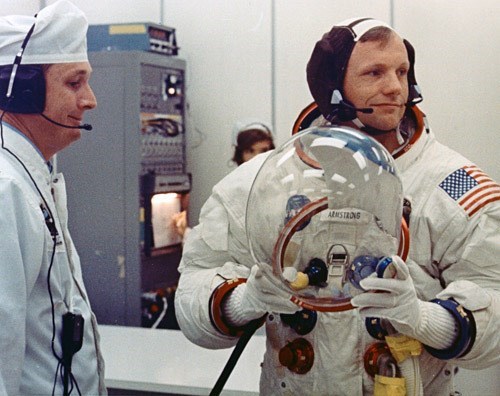 |
| Armstrong getting ready for the launch (http://vintagraph.com/space-photos/apollo-11/5358230 ()) |
Not only was he notable for his dedication, but Neil Armstrong was also known for his courageous and brave heart. In preparation for the Space Race between the U.S. and the Soviet Union, a battle between the two nations to see who would "reign" outer space, Neil Armstrong "underwent four years of intensive training for the Apollo program" (Jones). During these four years of training, Armstrong came face to face with death twice. Yet, although he almost died, "Armstrong went back to his office to do some paperwork" (Schorn) because "there was work to be done" (Schorn). Representing America, Armstrong willingly put his life on the line to bring hope to the U.S. by getting a man on the moon before the Soviets. He willingly risked anything to fulfill the American dream. His brave heart allowed him to bring himself back to work every day to keep moving forward. Despite knowing what laid ahead on the perilous road he was walking, he trudged on because he had the weight of a nation upon his shoulders. Neil Armstrong's courageousness was displayed again during the landing of the Eagle: "The preselected landing area turned out to be much rougher than thought and Armstrong as forced to guide the Eagle over the terrain until he found a vacant site" (Notable Scientists from 1900 to the Present). Barely surviving, Armstrong gave his all to serve his country and make it proud. Armstrong's courageousness allowed him to act quickly in dangerous moments, allowing him not only to save his own life but others' (his fellow astronaut's) lives as well. He was able to take charge and make crucial decisions during life-and-death situations. He had the bravery to take responsibility for his fellow friends and his actions. In society today, many get scared when they are met with roadblocks in their lives and run away from them, rather than confronting the problem. Neil Armstrong possessed a trait lacked by others, which made him and his actions stand out from others. The reason why Armstrong was able to endure through all the hardships life threw at him was because he met every obstacle head on with his never-failing bravery.
Page created on 10/12/2012 12:00:00 AM
Last edited 1/9/2017 9:21:34 PM
